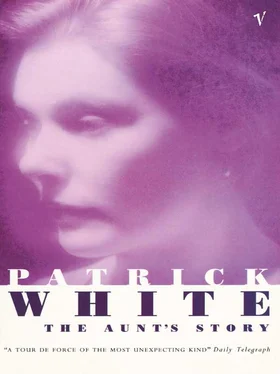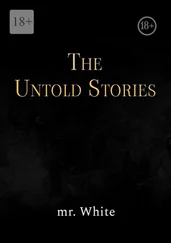The long green shape of his face sprouted from the kerb, yearning outwards, after some unseen rain.
‘Oh, mummy, mummy,’ sighed the m  n, ‘I feel as sick as sin.’
n, ‘I feel as sick as sin.’
The next day Theodora Goodman got herself a job in a canteen. Whether she listened to them or not, the soles of her feet ached, which was preferable to the aching of darkness. She stood under the girders, amongst the urns, and sometimes a face searched her for more than change, the clear faces with the bronze eyelids, or thick white drooping faces with secretive, porous skins. Under the girders the urns exhausted themselves in steam. The air was as poignant as the air of railway stations. There was, of course, the same coming and going, the same solitariness even in a crowd. One man showed her a picture he had taken from a Hun. It was a photograph of two girls, two sisters, of whom the elder was wearing a locket. Staring and smiling out of the cracks of the soldier’s hand, the faces of the girls expressed a belief in continuity, at least up to the moment when the photographer had squeezed the bulb. Theodora remembered the picture, and sometimes wondered at what point the illusion of individual will had succumbed to the universal dream.
‘Theodora is wearing herself to a shadow,’ confided Mrs Goodman.
There was not so much pity in her voice as a horrid suspicion that a shadow might escape. This kept Mrs Goodman breathless with anxiety. She would sit. She would sit and think, and listen for Theodora’s key, and her long step, which would make her irritable. She sat and longed to be made irritable again.
‘It is all very well,’ Mrs Goodman said. ‘But at this hour, I thought something must have happened.’
‘A ship arrived,’ Theodora said.
She had begun to hate their thin house. You could open the compartments of the house and know, according to the hour, exactly what to find, an old woman grumbling at her combinations or laying out a patience, a young woman offering objects of appeasement, or looking out of the window, or switching off the light. It was better in darkness. Theodora was less conscious of her mother’s eyes. Because when there was nothing left to say, Mrs Goodman could still look.
This is my daughter Theodora, Mrs Goodman did not say, but looked, my daughter Theodora, who is unlike me either in behaviour or in body, and who at best was an odd, sallow child in that yellow dress which was such a mistake. If it were Fanny, ah, Fanny is different, who wore pink, and married well, and is a bright young woman. I remember a morning when she pricked her finger, embroidering a sampler, and I sucked the blood oozing from her little finger. Fanny was my child. But Theodora ran away and hid, or sulked about the country with that rifle, which made us all ridiculous. Theodora hides still, in the darker corners of the house, amongst the furniture, or she hides her face in a silence and thinks I cannot see. Now that her sense of duty to the world sends her to work in a canteen, she hopes that this may absolve her from duty to her mother. But I think and hope that she will not be so heartless. If I could be certain. Life would be simpler, neater, more consoling, if we could take the hearts of those who do not quite love us and lock them in a little box, something appropriate in mother-o’-pearl. Then I would say: Theodora, now that you are hollow, my words will beat on your soul for ever so that it answers regularly as an African drum, in words dictated by myself, of duty and affection. As it is, you are a hard, plain, egotistical young woman who will never interpret the meaning of love.
Instead Mrs Goodman complained, in words, into the darkness. ‘Theodora, why must we sit without the light?’ Her words were soft, and old, and hurt.
‘Because it is more soothing,’ said the voice of Theodora. ‘I was tired.’
‘Just as you think,’ said the old soft voice of Mrs Goodman. ‘I wonder where Fanny is,’ it sighed.
‘Where should she be?’ said Theodora. ‘With her husband.’
‘There is no need to snap at me, dear.’
But now Mrs Goodman was consoled, now that she had been handed a photographic group. This was what she had been waiting for. Frank and Fanny Parrott on the steps. Frank had not enlisted of course. He had family obligations. He was buying a place. He would own many sheep and become a figure in the country. It was decided from the start that time would not stand still for Frank and Fanny Parrott.
Dearest Theodora (Fanny Parrott wrote in time),
It is just a week since we took possession at Audley, and everything is still so topsy-turvy I can scarcely collect my thoughts to write. There are packing cases in the hall, builders in the kitchen quarters, and shavings everywhere! But I must do my best to describe our place, I am so excited, it so far exceeds all that Frank had said. By this I mean the house, and not the land, because land is just land, and Frank says he is pleased with the stock, so I suppose he is. But the house, Theo, is so lovely, a new shiny brick, you would say quite new, with little balconies and gables, and shiny turrets like a medieval castle, and some of the windows are divided up by lead into those little lozenges. I feel I am in Europe ! There is a fine gravel drive leading up to the porch, which gives a house an unusual air in the country, and there are neat rose-beds, really beautifully laid out, not like our higgledy-piggledy old rose garden at Meroã.
Inside there are several big and magnificent rooms which we shall not use, except when we entertain, and a study for Frank, and a little room which I shall call my boudoir and live in mostly. It was a stroke of fortune, such a house, with what Frank says is the right land, but sometimes it does give me the shivers, when I go through the rooms where they found Mr Buchanan, but they say he was alwa  s unstable, and once as a boy had opened his veins with a razor, now this tragedy with a pistol. They say he had a mistress, quite a common woman, who used to take baths in milk, like some empress, wasn’t it!
s unstable, and once as a boy had opened his veins with a razor, now this tragedy with a pistol. They say he had a mistress, quite a common woman, who used to take baths in milk, like some empress, wasn’t it!
I forgot to say there are five spare rooms, and one room we shall use for a nursery — when! Dear Theodora, it will be such a joy, but of course there is plenty of time, and I am determined to enjoy my life, because you never know, and this sad war, we might have gone to Europe.
Now, what about you, Theo? Some time I mean to have a straight talk, because we both feel it is time you married, someone quiet and steady, not necessarily exciting, because this would not be the right kind of man, I mean the kind you like. So I am going to rack my brains, and then I shall insist.
Darling, I wonder if you would do something for me. I wonder if you would buy six yards of blue velvet to match the enclosed pattern of silk, if you can find it. This dreadful , ravaging war! The poor Hetheringtons have lost their second son. So sad.
Frank says I must get you to stay as our first visitor and ask over at the same time some good-looking young man.
My love to dearest Mother, I hope she is not bored, and to you, of course, Theodora, lots.
Your loving
Fanny
P.S. I saw that Una MacKenzie (Russell that was). She was quite green when she heard about my house, and that vulgar husband, they say he is on the booze !
P.P.S. Daisy Ritchie has had the Vice-Regals to stay. I am puzzling my head where she put them, it is such a very miserable house, with only recently a W.C., and the door of that doesn’t lock.
Reading the letter from Fanny, Theodora sat again on the bed. They were darning stockings, in midsummer, at Meroã, and Fanny was eighteen. This had remained her age. Fanny loved the glossy things, to take up by handfuls, and hold, and keep. Theodora touched the little square of pale blue silk, for matching which she would receive a husband. If Fanny did not forget, between altering the kitchen quarters and entertaining in the magnificent, ordinarily closed rooms. Although Fanny’s face was closed to her own reality, there were times when Theodora loved her, the child of eighteen, smooth and pretty as a square of pale blue silk. It is these little tangible moments, she felt, that make the blood relationships almost congruous.
Читать дальше

 n, ‘I feel as sick as sin.’
n, ‘I feel as sick as sin.’ s unstable, and once as a boy had opened his veins with a razor, now this tragedy with a pistol. They say he had a mistress, quite a common woman, who used to take baths in milk, like some empress, wasn’t it!
s unstable, and once as a boy had opened his veins with a razor, now this tragedy with a pistol. They say he had a mistress, quite a common woman, who used to take baths in milk, like some empress, wasn’t it!










